https://www.philahomeopathy.com/fibromyalgia-natural-treatment/
Treatment for fibromyalgia
Treatment for fibromyalgia tries to ease some of your symptoms and improve your quality of life, but there’s currently no cure. Since symptoms are diverse and vary among patients, treatment for fibromyalgia must be individualized for each patient.
Treatment for fibromyalgia is both medication and non-medication treatments. Medication treatments for fibromyalgia frequently help manage the pain and sleeplessness from which fibromyalgia patients suffer. However, non-medication treatments are known as natural remedies for fibromyalgia which include education, exercise, stress reduction, and so on.

Ultimately, the physician, physical therapist, and patient may all play an active role in the management of fibromyalgia.
Medication treatments
The medication treatment frequently helps manage the pain and sleeplessness from which fibromyalgia patients suffer. Medicines for fibromyalgia include:
- Tramadol (Ultram) is an opioid pain reliever, it is a medicine for fibromyalgia that can reduce the symptoms of fibromyalgia but should be used with caution as sometimes the use of opioids can worsen the pain cycle in fibromyalgia.
- Memantine (Namenda) is medicine for fibromyalgia commonly used for dementia. Preliminary studies show that memantine may be helpful with pain and other symptoms of fibromyalgia, but further studies are needed to confirm this.
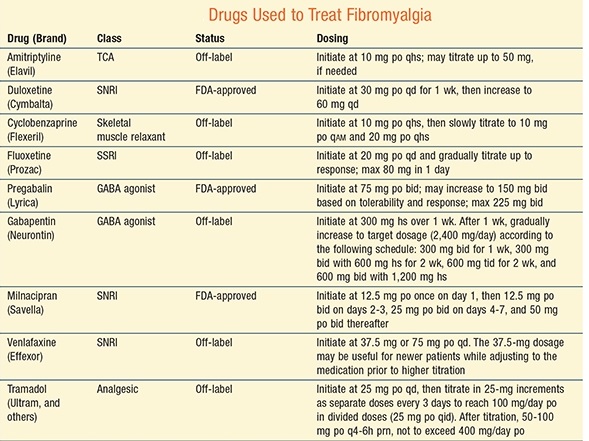
Other medicines for fibromyalgia include:
- Acetaminophen
- Ibuprofen
- Naproxen
If these drugs don’t reduce your pain symptoms, your doctor may recommend a prescription pain reliever. However, opioid-based pain relievers aren’t recommended for people with fibromyalgia, as they can lead to dependence and may even worsen your pain over time.
In addition, certain types of antidepressants have been found to work on fibromyalgia pain and reduce fatigue. Other antidepressants can help you sleep better. Your doctor may also suggest muscle relaxants or even anti-epileptic drugs (AEDs) relieve pain.
What is Fibromyalgia?
Fibromyalgia is a chronic (long-term) disorder defined by pain and tenderness throughout your body, as well as fatigue. People with fibromyalgia tend to have a heightened sense of pain. This feeling is sometimes described as a constant muscle ache.
Formerly known as fibrositis, fibromyalgia is often considered a rheumatic, or “arthritis-like,” disorder. But unlike arthritis and certain related conditions, it doesn’t cause damage to joints, muscles, or other tissues. Fibromyalgia isn’t a progressive disease, which means that it won’t steadily worsen over time.
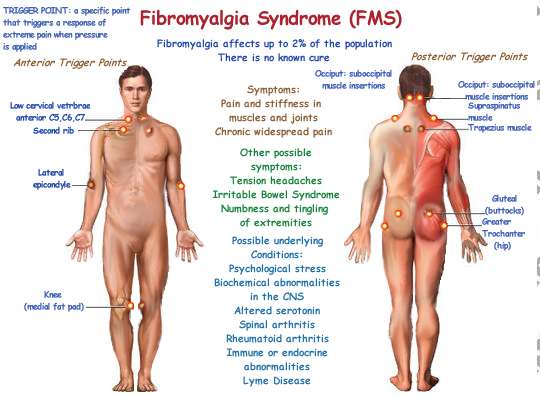
Is Fibromyalgia Real?
Fibromyalgia is very real. However, there are no specific diagnostic tests for of fibromyalgia, which may cause doctors challenges during diagnosis. Also, the symptoms of fibromyalgia can be similar to those of other conditions, which may lead to a misdiagnosis.
Fibromyalgia and Arthritis
Fibromyalgia is not a form of arthritis (a disease of the joints), but rather a muscle disorder. Fibromyalgia and arthritis can cause significant pain and fatigue as well as interfere with a person’s ability to carry on daily activities. However, the symptoms of fibromyalgia do not typically worsen over time, unlike the symptoms of arthritis. It is common for fibromyalgia to be associated with another joint disease, such as systemic lupus or rheumatoid arthritis.
Fibromyalgia – The disease of the connecting tissues
Fibromyalgia is a disorder that causes so much fatigue and muscle pain in the body. As the name Fibromyalgia implies, it means pains that originate from fibrous tissues of the body which include the tendons, ligaments, and muscles. Fibromyalgia is sometimes assumed to be the same as chronic fatigue syndrome CFS because of some symptoms they share, but the characteristic difference is that Fibromyalgia has specific tender points on the body.
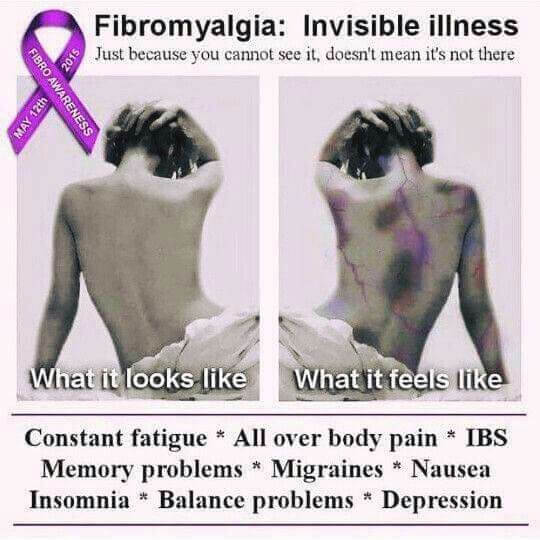
These tender points include the neck, shoulder arms, back, hips, and legs which hurt when pressure is applied to them. The severity of the pain experienced varies from person to person, and the patients are easily exhausted without any apparent cause or strenuous activity done. Fibromyalgia is prominent in men than women, and it cut across all ages.
Symptoms of fibromyalgia
Symptoms of fibromyalgia often begin after physical or emotional trauma, such as an illness, surgery, infection, a stressful life event, or injury. Some experts believe these events may trigger the onset of the disorder, but it’s unclear exactly how this connection could be explained.
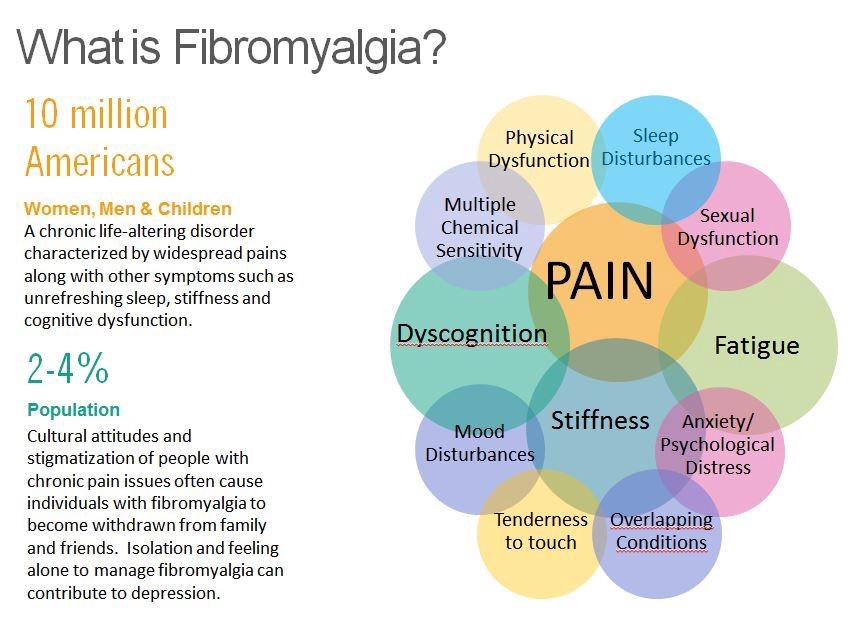
Fibromyalgia is known for causing widespread pain and tenderness throughout the body, as well as fatigue. Listed below are symptoms of fibromyalgia:
- Difficulty sleeping
- Problems with memory or concentration
- Dizziness
- Numbness and tingling in the hands and feet
- Sensitivity to bright lights or loud noises
- Headaches
- Digestive issues
- Dry eyes or mouth
Because the symptoms of fibromyalgia are similar to those of many other conditions, diagnosing fibromyalgia can be difficult.
Symptoms and Signs of Fibromyalgia
Pain is the main characteristic complaint reported by Fibromyalgia patients as mentioned earlier. This pain can come in different forms, and this includes deep muscular aching pain that could be felt as shooting or stabbing pain and at times may come as a throbbing or burning pain sensation. The pain is experienced in the group of muscles that are in constant use.
Another indicator of Fibromyalgia is fatigue which can be mild but sometimes experienced as an enormous drain of energy which is also referred to as brain fatigue. Other features include sleep disturbance which may come as a tired feeling after waking up from sleep, chronic headache, chest pain, and migraine, premenstrual syndrome with a painful period, muscle twitching, morning stiffness, tingling sensation, numbness, dizziness, and impaired coordination.
Symptoms of fibromyalgia in women
Fibromyalgia is a condition that is more prevalent in women than in men. Up to
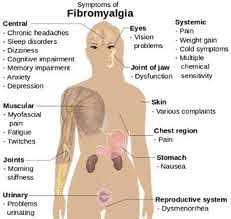
90% of all people with fibromyalgia are women. It is possible that hormones are responsible for this huge gender difference, but the exact reason is unknown.
Women with fibromyalgia may experience heightened or different symptoms compared with men.
Specific symptoms of fibromyalgia in women
- Women are more likely to experience:
- Fatigue in the morning
- Pain all over the body
- Symptoms specific to irritable bowel syndrome, commonly known as IBS
Additional symptoms of fibromyalgia in women may involve:
Menstruation
- Fibromyalgia can affect the menstrual cycle. Periods may be heavier, and women may experience painful menstruation, which is called dysmenorrhea.
Pregnancy
- Many women with fibromyalgia have no problems during pregnancy, but in some cases, pregnancy can worsen symptoms of the condition. Also, fibromyalgia can lead to heightened fatigue and mood swings, which are common in pregnancy.
Causes of fibromyalgia
Researchers don’t know the exact causes of fibromyalgia, but it seems to occur when the body’s central nervous system doesn’t process pain properly. While pain in fibromyalgia may feel like it’s coming from a specific area of your body, it’s actually originating in your brain, specifically from the central nervous system.
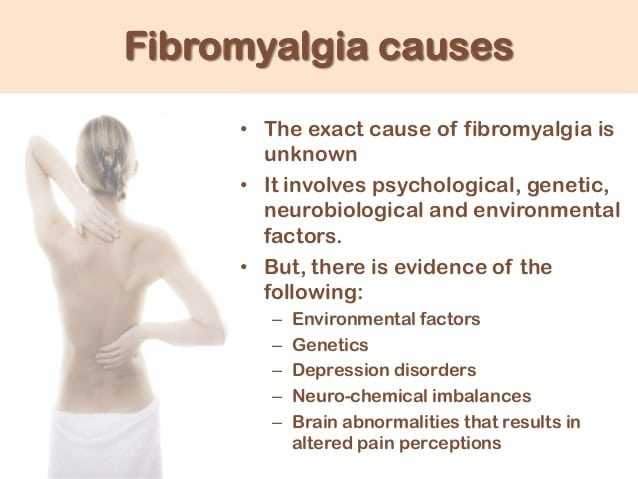
Even though it’s often grouped with rheumatic diseases like arthritis and lupus, fibromyalgia isn’t considered to be a disease of inflammation, or a joint or muscle disorder. It’s also not an autoimmune disorder – a condition in which the body’s immune system mistakenly attacks healthy tissues.
Numerous scientists accept as true that recurring nerve stimulation causes changes in the brain and spinal cord of people with fibromyalgia. This change involves an abnormal rise in certain chemicals in the brain that signal pain.
In addition, pain receptors in the brain seem to develop a type of pain memory and become allergic, meaning they can overreact to painful and painless signals.
There are probably numerous reasons that lead to these changes, and thus become causes of fibromyalgia, including:
- Genetics causes of fibromyalgia:
Because fibromyalgia tends to be inherited, there may be certain genetic mutations that can make you more susceptible to developing the disease.
- Infection may become one of the fibromyalgia causes:
Some conditions may worsen or be the initial cause of fibromyalgia.
- Physical or emotional events are the most common causes of fibromyalgia:
Fibromyalgia can sometimes be caused by a physical event, such as a car accident. Prolonged psychological stress can also cause this condition.
While the causes of Fibromyalgia are not so specific, there are likely some triggers of occurrence that are found to be responsible for musculoskeletal pain. These triggers could be an infection, injury, and an abnormal level of Substance P and Serotonin in the body.
Natural treatment for fibromyalgia

Natural treatment for fibromyalgia is a non-medication treatment for fibromyalgia and the cornerstone of treatment for fibromyalgia. With this type of treatment, many people improve without medications.
Listed below are different approaches to Natural treatments for fibromyalgia
Home remedies for fibromyalgia – most common natural approach to the treatment of fibromyalgia
Home remedies for fibromyalgia are a treatment for fibromyalgia that can be achieved at home. Listed below are the most fundamental rules for home treatment for fibromyalgia
Stress Reduction
- Stress reduction is one of the home treatments for fibromyalgia. Reducing stress can help with muscle relaxation and improve non-Rapid Eye Movement (non-REM) sleep. Inadequate sleep of this type is felt to play a central role in promoting the symptoms of fibromyalgia. The response to stress differs from person to person. The reduction of stress in the treatment of fibromyalgia must be individualized for each patient.
Exercising
- Aerobic activities that exercise the muscles can greatly relieve the symptoms of fibromyalgia. Many experts on fibromyalgia feel that exercise works by promoting the non-REM sleep that is commonly deficient in patients with this illness. Low-impact aerobic exercises, such as swimming, cycling, walking, and stationary cross-country ski machines can be very effective for patients who are unfamiliar with exercising options.
Self-education.
- As people with fibromyalgia develop a better understanding of their condition, it becomes far easier to cope with and address. Furthermore, for some, simply the realization that the condition does not threaten the body’s organs and often improves over time can greatly relieve anxiety. The anxiety is often due to concern about the cause of the frequent pains of fibromyalgia.
Yoga
- Yoga for fibromyalgia is another home remedy for fibromyalgia that can help stretch your body and loosen up tight muscles and joints. It also helps with balance and strength, and, as you become more advanced, it can provide you with a cardiovascular workout as well. Yoga for fibromyalgia can also help you relax, calm and focus your mind, and deal with emotional turmoil.

Diet for fibromyalgia – an essential part of any natural treatment for fibromyalgia
Diet for fibromyalgia is another home treatment for fibromyalgia that can help ease the symptoms of fibromyalgia. Diet for fibromyalgia high in whole, unprocessed foods may help with fibromyalgia symptom management.

The following provides an overview of recent research into nutrients that may be beneficial additions to a fibromyalgia diet:
- Antioxidants as part of a diet to help fibromyalgia: Antioxidants are molecules that stop oxidation (a chemical reaction that can produce something called free radicals that can damage cells). The body’s antioxidant system provides a defense to keep these free radicals in check. Dietary antioxidants help our bodies to maintain our antioxidant systems. Examples of antioxidants are vitamins C, A, E, and melatonin to name a few.
- Amino acids in the fibromyalgia diet: Amino acids are the building blocks of proteins and make up a large part of human muscles and cells. There has been some research showing that patients with fibromyalgia seem to have lower levels of certain amino acids in their blood.
- Coenzyme Q10 as part of a diet to help fibromyalgia: Coenzyme Q10 is an antioxidant that is important for cell function. There is some evidence that including coenzyme Q10 in the diet may improve fibromyalgia symptoms.
Massage for fibromyalgia – a very effective and relaxing treatment for fibromyalgia.

Massage for fibromyalgia is another home remedy for fibromyalgia that involves rubbing the joints, muscles, tendons, and ligaments to relieve the pain and/or tension caused by fibromyalgia. A fibromyalgia massage may range from deep pressure to light stroking depending on the needs of the person receiving the massage. According to recent research, massage for fibromyalgia is very effective in relieving fibromyalgia symptoms.
Acupuncture for fibromyalgia – an ancient Chinese natural treatment for fibromyalgia
Acupuncture for fibromyalgia is a natural treatment for fibromyalgia that has become more popular over the years, especially since more and more research has shown the benefits of this treatment.
Acupuncture points are located on meridians; however, modern acupuncture may also be performed on myofascial trigger points, which are tight areas of connective tissue that can radiate pain. Most people even those with fibromyalgia report no pain when the needles are inserted and upon needle grasp during and after treatments.

Listed below are the benefits of acupuncture for fibromyalgia
- Lower pain levels
- Better sleep
- Possible immune system stimulation5
- Enhanced relaxation
- Better overall health
Herbs for fibromyalgia – an effective home-based natural treatment for fibromyalgia

Herbs for fibromyalgia are natural remedies for fibromyalgia that can relieve and even eliminate the symptoms. Here are some examples of the most commonly used herbs for fibromyalgia:
- John’sWort – sleep aid, raises serotonin levels, can ease depression, can help reduce pain, muscle relaxer
- Willowbark – pain-relief without stomach distress or risk of bleeding
- Kava – This herb for fibromyalgia help with sleep disturbances, insomnia
- Cat’s Claw – general symptom improvement with continued use, lessening of pain response over time
- Lavender essence – used to massage sore, painful muscles when diluted with jojoba, olive, or sunflower oil; aromatherapy to calm nerves and relax
- Capsaicin, and Cayenne – fibromyalgia pain relief
- Ginger – compress for pain, improves circulation, and increases pain-relieving properties of other herbs
- Grapeseed Extract – powerful antioxidant (procyanidins) from the seeds of wine grapes, inhibits inflammation and reduces pain
- Ginseng – builds immunity, reduces stress
- Nettle – pain relief, found in whole grains and leafy greens
- Arnica – herbal back pain remedy found in pharmacies
- Boswellia – pain, and morning-stiffness
- Pomegranates – antioxidant, anti-inflammatory properties
Homeopathy for fibromyalgia – #1 natural treatment for fibromyalgia
Homeopathy for fibromyalgia offers a natural remedy for fibromyalgia and helps alleviate the symptoms and treat the problem for long-term relief. They have no side effects and are made of natural substances that are safe for use.
Homeopathy is a practical treatment approach for Fibromyalgia and is recommended for getting rid of the associated pain and fatigue symptoms of the disease. With the use of appropriate homeopathic medicines, the general vitality of a patient can be restored optimally and the treatment is devoid of side effects of any form.

What makes Homeopathy be a useful alternative treatment is that it sets the body on a natural healing path. Homeopathy stimulates the body’s ability to heal itself through the theory of ‘’like cures like’’ which means using a substance that produces a particular symptom in a healthy person to cure a sick person with that specific symptoms. This remedy is made from the element and administered to patients. A homeopathic remedy made from small diluted doses of a particular substance which will naturally cause illness when applied in large quantity but when used in diluted form performs healing. This is referred to as the law of minimum dose which is works on the principle of “the lower the dose, the more effective in treating a disease.” Homeopathic remedies are prepared from plants, animals, and minerals as natural substances.
The effectiveness of Homeopathic treatment is possible not only because of the efficacy of the remedies but also the procedure involved in the administration of the Homeopathic treatment. The personal health history including the genetic history of the patient taken into account as well as the body physiology and the most significant symptoms. This will ensure that Fibromyalgia is the ailment to be treated.
The treatment method for Fibromyalgia may vary from person to person as it depends on a wide range of factors that make each patient peculiar. Homeopathic treatment is unique and individualized because each patient receives treatment specific to local complaints and general constitution. The length of therapy although usually long and may vary.
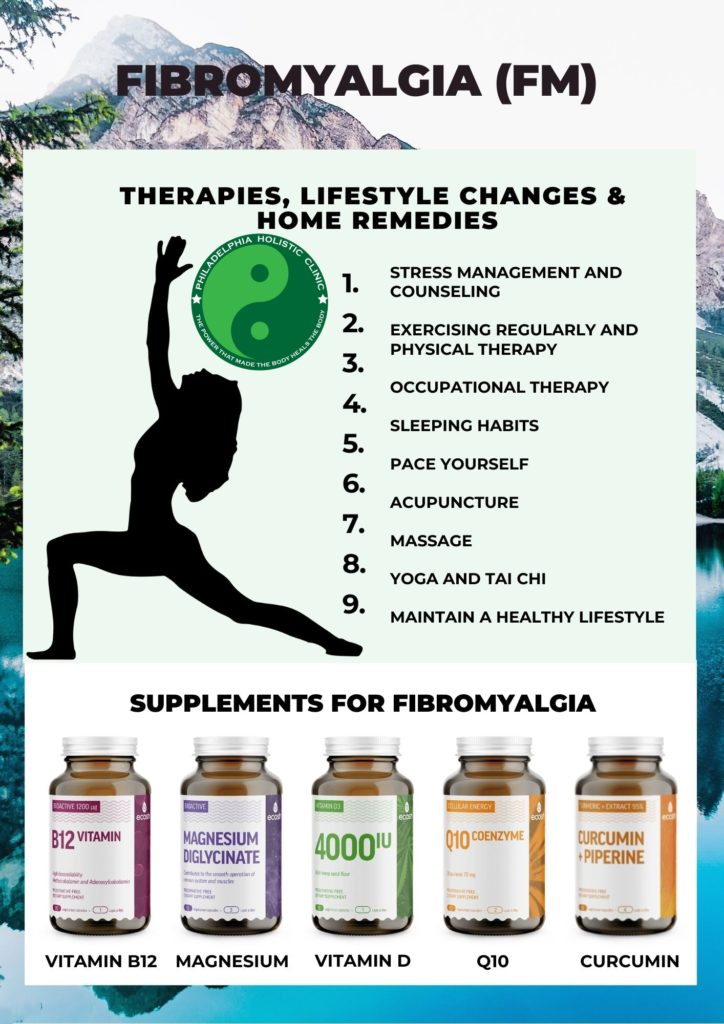
When Homeopathic treatment is compared to conventional treatment of Fibromyalgia, it is clear that Homeopathy has more to offer. This form of natural medicine will not only treat physically but also help the mental and emotional needs of a patient. Homeopathy also helps to address stress-related triggers that can in turn trigger Fibromyalgia. Homeopathy improves the vitality and the immunity of the body. This will bring about a balanced sensitivity to pain which is the dominant sign of Fibromyalgia.
Listed below are homeopathic remedies commonly used for fibromyalgia
- Rhus Tox is a top-listed Homeopathy for fibromyalgia. It is indicated in cases where there is widespread pain in the body. The pain is present in the muscles, tendons, and ligaments and can be tearing, shooting, stitching in nature.
- Arnica Montana is a natural medicine for fibromyalgia prepared from the Leopard’s Bane plant. It is primarily used in cases of fibromyalgia where there are sore, bruised pains in the body.
- Kali Phos is a natural remedy for fibromyalgia used to treat marked fatigue and sleep issues in cases of fibromyalgia.
- Bryonia Alba is a natural medicine prepared from the plant Wild Hops. The natural order of this plant is Cucurbitaceae. Bryonia Alba is a very beneficial medicine for fibromyalgia considered in cases where pains get worse from motion.
- Ruta Graveolens is a remedy for fibromyalgia prepared from the fresh plant of Garden Rue of the family Rutaceae. Its use is indicated for pains in the body along with restlessness
Homeopathic treatment for fibromyalgia in Philadelphia
At the Philadelphia Homeopathic Clinic, Dr. Tsan and associates use the combination of homeopathic remedies and acupuncture for the successful treatment of Fibromyalgia. Only at this clinic, we use the most innovative technologies in modern holistic and integrative medicine, known as Homeosiniatry – injections of the homeopathic remedies to correspondent acupuncture points. This integrative approach in clinical studies demonstrated significant improvement in patients’ condition and many cases full recovery.

To book an appointment for Homeopathic Consultation and to meet Dr. Tsan visit our “Book Appointment” page or click here.
Comments
Post a Comment